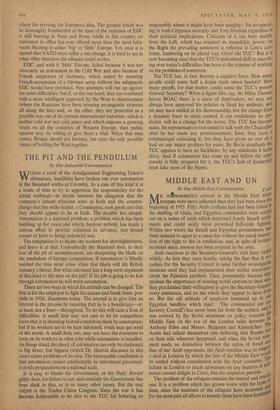THE PIT AND THE PENDULUM
By Our Industrial Correspondent WITHIN a week of the Amalgamated Engineering Union's ultimatum, hostilities have broken out over automation in the Standard works at Coventry. In a case of this kind it is a waste of time to try to apportion the responsibility for the actual outbreak—to decide between the allegation that the company's labour relations were at fault and the counter- charge that the strike leader, a Communist, took good care that they should appear to be at fault. The trouble lies deeper. Automation is a national problem; a problem which has been building up for years and which, because nobody has made a serious effort to provide solutihns in advance, was bound sooner or later to bring industrial war.
The temptation is to blame the workers for shortsightedness, and leave it at that. Undoubtedly the Standard men, in their fear of the pit of unemployment, are sharpening the blade on the pendulum of foreign competition; if automation is blindly resisted the time must come when that blade will slit British industry's throat. But what relevance has a long-term argument of this kind to the man on the job? If his job is going to be lost through automation he will resist automation.
There are two ways in which his attitude can be changed. The first is for the employer to fight his unions and break them: pos- sible in 1926; disastrous today. The second is to give him an 'interest in the process by ensuring that he is a beneficiary—or, at least, not a loser—throughout. To do this will raise a host of difficulties. A small firm may not care to let its competitors know that it is planning to steal a march on theM by automation; but if its workers are to be kept informed, rivals may get wind of the secret. A small firm, too, may not have the resources to keep on its workers in other jobs while automation is installed. As things stand, the shock of automation can only be cushioned in big firms; but bigness (which Dr. Harrod discusses in this issue) raises problems of its own. The inescapable conclusion is that automation cannot satisfactorily be introduced piecemeal. I t needs preparations on a national scale.
It is easy to blame the Government, as the Daily Herald glibly does, for failure to act; and certainly the Government has been slack in this, as in so many other issues. But the real culprit is the Trades Union Congress. Since the war it has become fashionable to be nice to the TUC for behaving so responsibly where it might have been naughty ; for co-operat. ing in both Crippsian austerity and Tory freedom regardless of their political implications, Criticism of it has been mainly from the Left, which has resented its monolithic power; er the Right the prevailing sentiment is reflected in Low's cart• horse, lumbering on its placid way. Good old TUC ! But it is now becoming clear that the TUC's undoubted skill in smooth• ing over today's difficulties has been at the expense of working on the problems of tomorrow.
The TUC has, in fact, become a negative force. How many people could name half a dozen trade union leaders? HOW many peopk, for that matter, could name the TUC's present General Secretary? When a figure like, say, Sir Miles Thomas leaves BOAC there is a sense of deprivation; we may not always have approved his policies or liked his methods, an we may have smiled at his showmanship, but the change front a dynamic force to static control, it can confidently be pre' dieted, will be a change for the worse. The TUC has become static. Its representatives trot round to talk with the Chancellor after he has made any pronouncement; later, they issue a communiqud criticising it; but they have given no sort of a lead on any major problem for years. By Bevin standards the TUC appears to have no backbone; by any standards it lacks drive. And if automation has come up and before the con!' munity is fully prepared for it, the TUC's lack of leadershiP must take most of the blame.










































 Previous page
Previous page